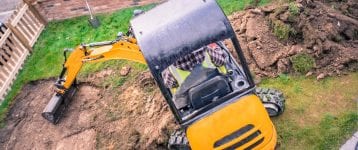A lot of times, a project is delayed in getting started because of the excavation work that needs to be done. Many home-owners think the project can be done without professionals. How hard is it to take a sledgehammer to a pool? It’s much more challenging and dangerous than you think. And if you are in the market for commercial excavation, the longer you sit on that project, the more money it will cost you. Take some time to understand these excavation types to help you hire the right team for your job.
How is Excavation Carried Out?
Whether you need commercial excavation or residential excavation, both require different excavation methods based on the specific project. Once you decide which type of material is specific to your project, you will be able to select the excavation method needed.
Task-Based Excavation Types
These excavation methods are commonly used in residential and commercial excavation. Meet with an excavation team and dazzle them with your knowledge when you ask whether they’ll be using cut and fill or borrow excavation for your next project.
Drainage
An example of drainage excavation is when water is not correctly draining in your backyard or a parking lot. Storm drains can be built using trenches or ditches for runoff.
Cut and Fill
Cut and fill excavation is also known as stripping, and it consists of clearing a large plot of land to make it ready for building. This may also include removing elevated sections to make sure the ground is level before construction begins.
Dredging
Dredging happens underwater when sediment deposits build up and block waterways intended for boat traffic. It involves the removal of underwater debris in rivers, canals, or shallow ocean passages.
Basement
When digging out for a basement, this requires basement excavation. Breaking through each layer of soil and digging through rocky surfaces is necessary to build out the basement of a home or building.
Channel
An existing channel may be blocked and require channel excavation to drain properly again. The clearing of the debris and sediment is necessary to get the water flowing again. The excavation team always provides the equipment needed to work underwater.
Trench
Trench excavation is used when digging pipelines or burying service lines. The digging length far exceeds the depth in this type of project. If you need a sprinkler system for your commercial building or home, trench excavation will be used to install the system.
Borrow
Borrow excavation involves saving all the materials excavated from one area of the project and using them in a different aspect of the project. This can include using the soil and rocks cleared from a construction site when leveling and using those same materials to fill or grade another area.
If you have a residential project regarding outdoor flooding, you can learn exactly how an experienced team plans to solve it through drainage excavation. Dredging and channel excavation may be more specific to commercial excavation projects. No matter what your project, Mikula Contracting can take care of it for you.
Material-Based Excavation Types
There are a variety of materials that an expert excavation team may work with when completing your project. Let’s go through the materials and examples of projects requiring the excavation of each one.
Topsoil
With topsoil excavation, the team will remove just the top layer of soil. Sometimes this needs to be done to clear out and start again with planting and growing healthy grass. The removal of this vegetation and dirt can also be done before building a structure to make the area sound and level. The excavated areas will then be ready for construction.
Muck
Muck is the mix of soil and water that makes it challenging to build on. Muck excavation removes the mushy substance so that a sturdy foundation can be used to build upon. Sometimes the muck is relocated to dry out and be used in a later project.
Earth
If a project requires digging a little deeper to create a building or bridge foundation, earth excavation comes into play. The topsoil is removed, and the layer below the topsoil is also removed so that the foundation can be laid.
Rock
Sometimes there is a layer of rock below the topsoil. A common purpose for rock excavation is when a team is hired for residential excavation for a pool, and they hit a layer of rock. The project gets more complicated as heavy machinery is used to break up the rock and transport it out.
These 4 types of materials are standard for excavation. When you choose the right team, they will be experienced with all material removals and know exactly what is needed for your project.
Can These Methods Be Used For Residential and Commercial Excavation Jobs?
These methods are used for both residential and commercial excavation. A team that is experienced in commercial excavation work can easily work with residential excavation and vice versa. When working with the earth and digging to remove different types of land, residential and commercial projects require the same methods.
If you are looking to dig for plumbing for your residential or commercial building, they would both use trench excavation. If you would like to even out bumpy land to build on top of it, earth excavation would be used to level the ground and lay the foundation.
Excavation contractors will encounter the same types of excavation among residential and commercial excavation. Muck can be present at a home building site just as often as it is found at a commercial site. Topsoil excavation can be important when trying to get grass to grow in a rundown, garbage-filled field that can be found in a neglected residential or commercial area. And rock excavation is often encountered when digging for a swimming pool or basement in residential or commercial buildings.
All types of excavation are used across residential and commercial projects, so many contractors specialize in both. When you choose an experienced contractor, they will explain your project’s plans and know which excavation methods will be needed.
Experienced Excavation Contractors in NJ
An excavation obstacle can be what is holding you back from starting your construction project. Do not procrastinate any longer, and take the steps toward getting the job done today. Hiring a team will leave the heavy lifting to the experts while you can relax.
The most important part of your excavation project is hiring the right team. With Mikula Contracting, you know that the project will be done safely and professionally. The expert team can answer any questions you have specific to your commercial or residential excavation project. Call today to set up your first appointment.



